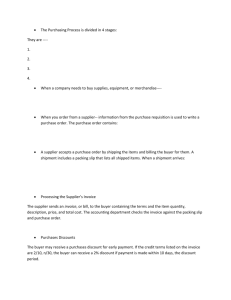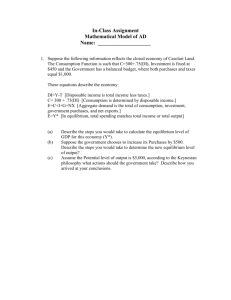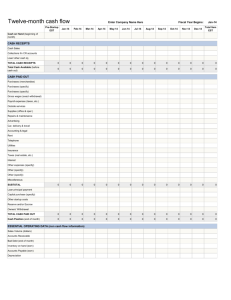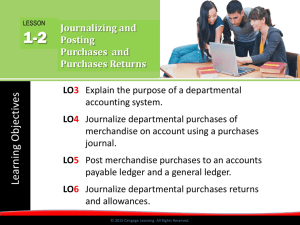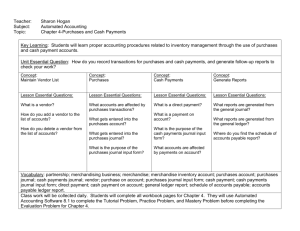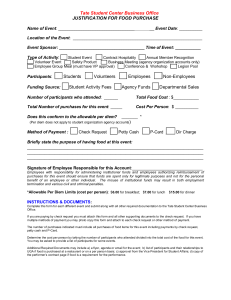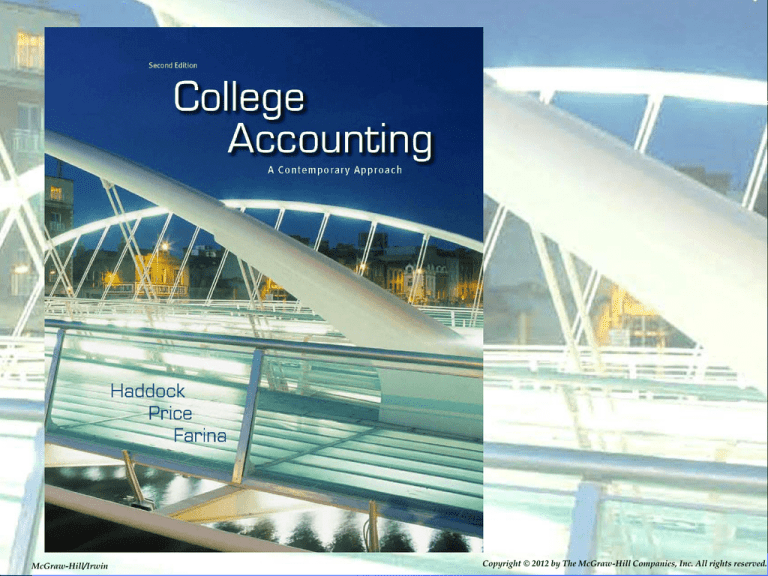
McGraw-Hill/Irwin
Copyright © 2012 by The McGraw-Hill Companies, Inc. All rights reserved.
8–1
Chapter
8
Accounting for Purchases, Accounts
Payable, and Cash Payments
Section 1: Merchandising Purchases
Section Objectives
1.
Record purchases of merchandise on credit in a
general journal.
2.
Compute the net delivered cost of purchases.
8–2
Merchandising Purchases
Accounting for Purchases
• Most merchandising businesses purchase goods on credit
under open-account arrangements.
• A large firm usually has a centralized purchasing
department that is responsible for locating suppliers,
obtaining price quotations, negotiating credit terms, and
placing orders.
• In small firms purchasing activities are handled by a
single individual, usually the owner or manager.
8–3
Purchasing Procedures
The Sales Department
sends an authorized purchase requisition to the Purchasing Department
The Purchasing Department
issues an authorized purchase order and sends to the selected supplier
A receiving report is prepared when the merchandise is received
The Accounting Department
receives the invoice and copies of the purchase order and receiving report
8–4
Purchase Requisition and Purchase Order
Lists the items
to be ordered
Specifies the
exact items,
quantity, price,
credit
termsand
8–5
Invoice
This is a purchase invoice for the customer
This is a sales invoice for the seller
8–6
Account Classifications
8–7
The Purchases Account
QUESTION:
What is the Purchases
account?
Wow! I need
to order more
inventory!
ANSWER:
The Purchases account
is an account used to
record cost of goods
bought for resale
during a period.
8–8
Purchases And Cash Payments With Freight Charges
QUESTION:
What is the Freight In account?
ANSWER:
The Freight In account is an account
showing transportation charges for
items purchased. It is also called
Transportation In account.
8–9
FOB shipping point and FOB destination
(FOB) shipping point:
Buyer pays the freight charge—the cost of shipping the
goods from the seller’s warehouse to the buyer’s location
FOB destination:
Seller pays the freight charges
Two ways to handle the freight charges paid by the buyer:
• Buyer is billed directly by the transportation company for the freight
charge.
• Seller pays the freight charge and includes it on the invoice.
8–10
Cost of Goods Sold
Price of goods (debit Purchases)
$4,760.00
Freight charge (debit Freight In)
Total invoice
Purchases
Dr.
4,760
Cr.
360.00
(credit Accounts Payable)
+
Freight In
Dr.
360
Cr.
=
$5,120.00
Accounts Payable
Dr.
Cr.
5,120
The cost of goods sold accounts have normal debit balances
8–11
Objective 1
Record purchases of
merchandise on credit in a
general journal
8–12
Purchases with Freight
8–13
Payment of Invoice with freight
The journal entry to record payment of this invoice on
January 30 using check number 152 appears below
8–14
Purchases Returns and Allowances
A purchase return is a
return of unsatisfactory
goods
Sorry, I
didn’t like
the color.
A purchase allowance is a reduction
in the price of the goods
8–15
A credit to the Purchase Returns and Allowances
account is made when a vendor returns something to a
supplier
Purchases Returns and Allowances
Returns
and
Allowances
A complete record of returns and allowances
A contra cost of goods sold account
Normal credit balance
8–16
Recording Purchases Returns And Allowances
On January 15 Maxx-Out Sporting Goods received
merchandise costing $4,760 from Modern Sportsman with
freight charges of $360 paid by Modern Sportsman
8–17
Recording Purchases Returns And Allowances
Some goods were damaged, and the supplier granted a
$476 purchase allowance on their credit memo 103 of
January 27.
8–18
Accounts Payable
476
Purchases Returns and Allowances
476
8–19
Purchases Discounts
Net 30 days or n/30:
Payment in full is due 30 days after the date of the invoice.
Net 10 days EOM, or n/10 EOM:
Payment in full is due 10 days after the end of the month
in which the invoice was issued.
2% 10 days, net 30 days; or 2/10, n/30:
If payment is made within 10 days of the invoice date, the
customer can take a 2 percent discount. Otherwise,
payment in full is due in 30 days.
8–20
Recording Purchases Discounts
Maxx-Out Sporting Goods received merchandise costing
$3,000 from The Modern Sportsman on January 10, Invoice
880, terms 2/10, n/30, with freight charges of $200 paid by
Modern Sportsman and added to the invoice
8–21
Recording Purchases Discounts
Maxx-Out Sporting Goods paid the amount due, after
deducting a $60 discount ($3,000 * 2%), on January 19
with check number 150.
8–22
Purchase return processed within the discount period
If there is a purchase return processed within the discount
period, the buyer is entitled to take the cash discount only
on the balance owed after the return.
8–23
Objective 2
Compute the net delivered cost of
purchases
Determining the cost of purchases
The income statement of a merchandising business
contains a section showing the total cost of
purchases.
This section combines information about
Cost of the purchases
Freight in
Purchases returns and allowances
Purchase Discounts
8–24
The net delivered cost of purchases for Maxx-Out
Sporting Goods for January is calculated as follows.
Purchases
$23,315
Freight In
Delivered Cost of Purchases
1,565
$24,880
Less Purchases Returns and Allowances
476
Less Purchases Discounts
124
Net Delivered Cost of Purchases
$24,280
8–25
Chapter
8
Accounting for Purchases, Accounts
Payable and Cash Payments
Section 2: Accounts Payable
Section Objectives
3.
4.
Post from the general journal to the general ledger
accounts.
Post transactions to the accounts payable
subsidiary ledger.
5.
Prepare a schedule of accounts payable.
6.
Demonstrate a knowledge of the procedures for
effective internal control of purchases.
8–26
Accounts Payable
Recording Merchandise Purchased with a Trade Discount
• International Sportsman offers merchandise for sale with a
list price of $1,000, with trade discounts of 20 percent and
10 percent, terms 2/10, n /30.
• Maxx- Out Sporting Goods purchases merchandise with a
list price from International Sportsman, Invoice 5201.
• The amount owed for the purchase is computed as follows.
8–27
Recording Merchandise Purchased with a Trade Discount
8–28
Objective 3
Post from the general journal to the
general ledger accounts
Posting to the general ledger is done in the same
manner as demonstrated in Chapter 4.
8–29
Objective 4
Post transactions to the accounts
payable subsidiary ledger
The Accounts Payable Ledger
The accounts payable ledger has three money columns.
The Balance column is presumed to contain credit amounts.
8–30
8–31
Objective 5
Prepare a schedule of accounts payable
The total of the individual creditor accounts in
the subsidiary ledger must equal the balance of
the Accounts Payable control account.
To prove that the control account and the
subsidiary ledger are equal, businesses prepare
a schedule of accounts payable.
8–32
Schedule of Accounts Payable
8–33
Objective 6
Demonstrate a knowledge of the
procedures for effective internal
control of purchases
8–34
Internal Control of Purchases
The objectives of the controls are to:
• Create written proof that purchases and
payments are authorized, and
• Ensure that different people are involved in the
process of buying goods, receiving goods, and
making payments.
8–35
Internal Control of Purchases
Effective systems have the following controls in place
1. All purchases should be made only after proper authorization
has been given in writing.
2. Goods should be carefully checked when received. They
should then be compared with the purchase order and with the
invoice received from the supplier.
3. The purchase order, receiving report, and invoice should
be checked to confirm that the information on the
documents is in agreement.
8–36
Internal Control of Purchases
4. The computations on the invoice should be checked
for accuracy.
5. Authorization for payment should be made by someone
other than the person who ordered the goods, and this
authorization should be given only after all the
verifications have been made.
6. Another person should write the check for payment.
8–37
Internal Control of Purchases
7. Prenumbered forms should be used for purchase
requisitions, purchase orders, and checks. Periodically
the numbers of the documents issued should be verified
to make sure that all forms can be accounted for.
8–38
Thank You
for using
College Accounting
A Contemporary Approach, 2nd Edition
Haddock • Price • Farina
8–39

